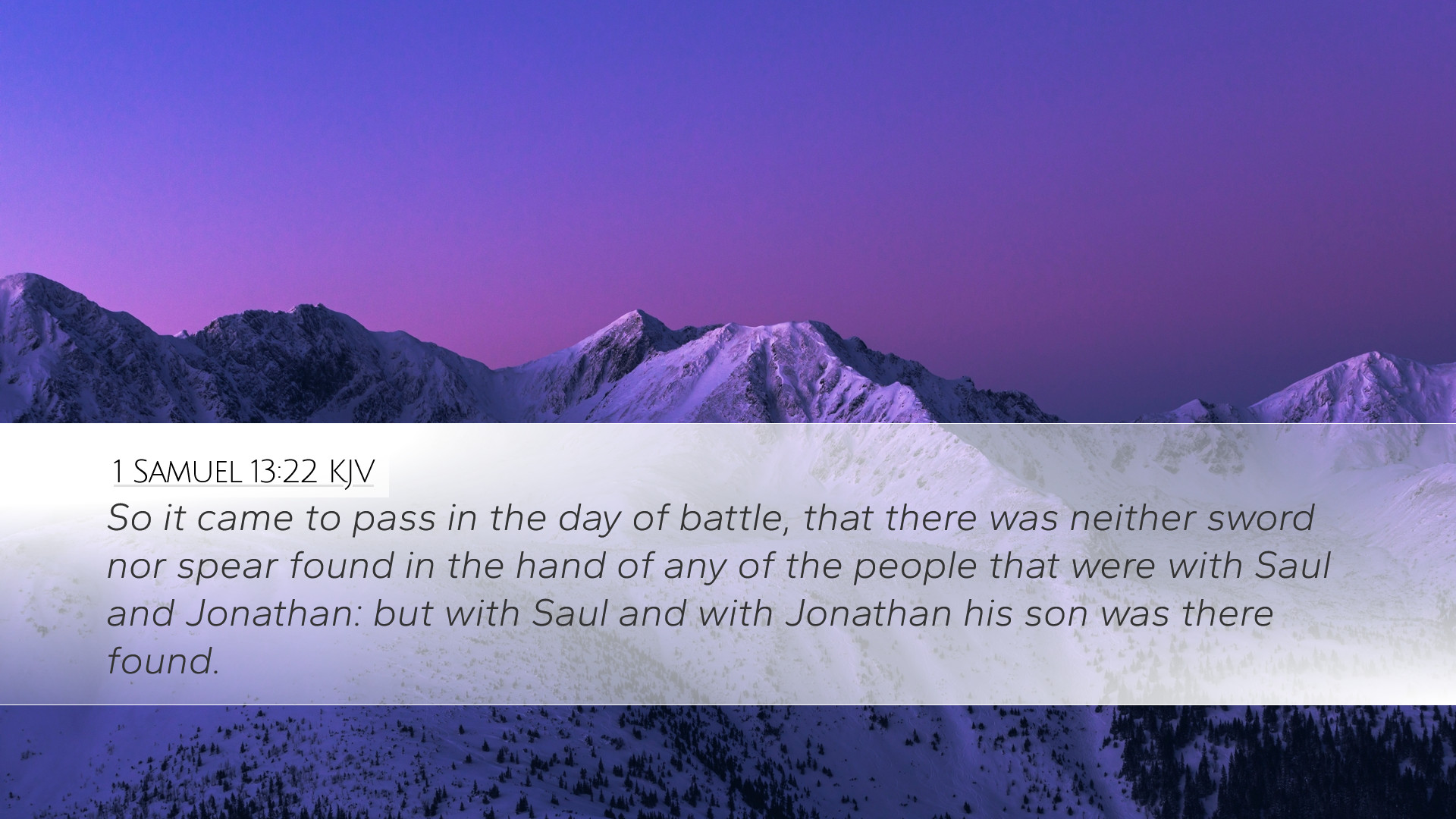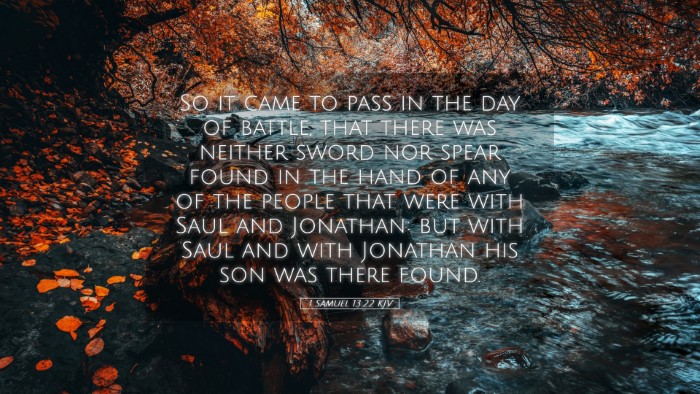Commentary on 1 Samuel 13:22
Verse Text: "So it came to pass, in the day of battle, that there was neither sword nor spear found in the hand of any of the people that were with Saul and Jonathan: but with Saul and with Jonathan his son was there found."
Contextual Overview
This pivotal verse occurs in a significant context, reflecting a critical moment in the history of Israel during the reign of King Saul. Samuel had previously anointed Saul as king, and yet, as the narrative unfolds, we observe a troubling situation for Israel as they face their enemies, particularly the Philistines.
Theological Implications
This passage opens a discussion on the reliance on God versus reliance on human strength and weaponry.
- Divine Provision versus Human Limitations: The absence of swords and spears emphasizes human inadequacy and the need for divine intervention in battles.
- Faith and Obedience: Saul's disobedience earlier in the scripture leads to dire consequences during battles, highlighting that God's favor does not rest upon those who sin against Him.
- Contrast of Leaders: Jonathan, Saul's son, represents a figure of faith and bravery against the backdrop of his father's failures, suggesting a deeper narrative of personal faithfulness amidst national disobedience.
Insights from Commentators
Matthew Henry
Matthew Henry notes that the lack of weapons among the Israelites reflects a broader spiritual condition. He elaborates on how this lack symbolizes the people’s disconnect from God who is their ultimate resource. It indicates a time where faithfulness to God is intertwined with physical and spiritual readiness. Henry encourages the reader to reflect on the importance of spiritual preparation, highlighting that our ultimate defense is not physical weaponry but faith in God. This serves as a reminder that in difficult times, our reliance must be on divine strength.
Albert Barnes
Albert Barnes provides a detailed historical analysis of the Philistine oppression that resulted in the Israelites' inability to arm themselves. He points out that Philistines had monopolized the blacksmithing industry, forcing the Israelites to resort to them for the sharpening of their plows and tools. This political and military disadvantage emphasizes the theme of oppression against those who stray from God’s covenant. Barnes argues that this arrangement symbolizes a key biblical principle: when God’s people forsake Him, they become vulnerable to their enemies. Thus, believers are called to remain steadfast in faith to avoid spiritual and physical oppression.
Adam Clarke
Adam Clarke's commentary focuses on the practical implications of the verse. He discusses that the reality of facing battle without weapons instills panic and desperation among the troops. Clarke implies that Saul’s government has failed to provide adequately for the defense of Israel, which reveals a critical failure in leadership. He meditates on the spiritual application of this scenario: the church is also at risk when its leaders neglect their spiritual responsibilities. Clarke's insight beckons the leaders and pastors of today to consider their roles in equipping their congregations for spiritual warfare, reminding them of the necessity to prepare their followers through the Word of God.
Application for Today’s Church
This verse and its commentary carry profound implications for contemporary believers:
- Preparation for Spiritual Battle: Just as the Israelites were ill-prepared for battle, churches today must equip their members spiritually through biblical teaching, prayer, and community.
- Faithfulness in Leadership: Spiritual leaders must examine their commitment to God and their people, ensuring that they do not lead their congregations into spiritual neglect, which can have dire consequences.
- Dependence on God: Modern-day believers must remember that true strength comes not from physical means or societal status but from an unwavering faith in God’s provision and power.
Conclusion
1 Samuel 13:22 serves as a sobering reminder of the consequences of turning away from God's will. Through the insights of esteemed commentators like Matthew Henry, Albert Barnes, and Adam Clarke, we recognize that the lack of swords and spears symbolizes not just military inadequacy but a deeper spiritual crisis. For pastors, students, theologians, and scholars, this passage encourages an introspection of where we place our trust: in weapons of war or in the weapons of our warfare, which are not carnal but mighty through God. May we take heed of this ancient narrative and arm ourselves with the spiritual resources provided by our Creator.


